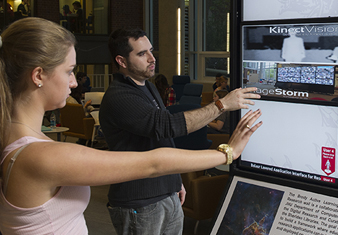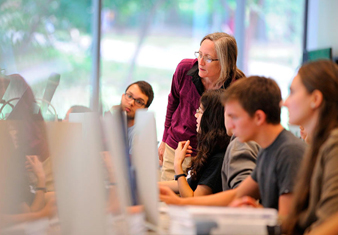
A Gateway to the Sciences
Innovation in education, spreading across the university.
The past year saw the completion of the first round of projects in the Gateway Sciences Initiative, which seeks to identify innovative ways to improve how we teach introductory science, engineering, and mathematics to our students.
One of the centerpieces of the initiative is an internal $2 million grant program designed to promote evidence-based instructional practices in these courses. A faculty committee defined the scope of the program and chose 10 first-round proposals for funding, including:
- A new approach to our Introduction to Statistics courses involves students learning through case studies—working with original data from real life cases—rather than the traditional textbook method.
- A peer-led team-learning program previously used in calculus and physics courses was adapted to the Introduction to Chemistry course taken by nearly 50 percent of all Hopkins undergraduates, and other courses as well. Formalized peer-led groups of eight to 10 students were organized to meet two hours each week for problem-solving sessions.
- An active learning eStudio was constructed as a collaborative learning space in Krieger Hall, featuring a number of student pods, each with a large flat-panel display and extensive floor-to-ceiling white boards, and an instruction station that allows control of all monitors to highlight student work and enable information sharing across pods.
 Assessments of many of the funded projects show gains in learning, and student feedback was highly positive. Perhaps the truest measure of their success? These and other GSI-inspired innovations are spreading across the university, as other faculty, departments, and even schools adopt the reforms.
Assessments of many of the funded projects show gains in learning, and student feedback was highly positive. Perhaps the truest measure of their success? These and other GSI-inspired innovations are spreading across the university, as other faculty, departments, and even schools adopt the reforms.
There will need to be ongoing work to learn from the pilots and build on the successes. To that end, the university has also launched a national conversation about the gateway sciences, with annual symposia that have drawn hundreds of faculty, staff, and other educators each year from across the university and the nation. A second round of funded projects is now underway.
Many of the pedagogical innovations that emerge from the Gateway Sciences Initiative will find a home in the Undergraduate Teaching Laboratories, a brand new 105,000-square-foot venue for undergraduate science education and research that opened in the fall of 2013. Described as an “intellectual playground” for our students, the $65 million building features cutting-edge labs, modern technology, and flexible spaces that facilitate integrated teaching across disciplines and break down conceptual walls in how we train our students and how our students learn.


